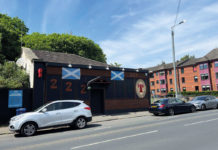COMMERCIAL property firms have painted a cautiously optimistic picture of the licensed trade market for the year ahead, tempering expectations on the potential for city centre sites with warnings on both Brexit and access to finance.
Recognising that 2016 “undoubtedly provided some turbulence in the wider economy”, Kevin Hunter of CDLH suggested the licensed trade had proven itself resilient despite economic uncertainty.

“The licensed sector remained highly buoyant with performance in the sector continuing to outperform previous years,” said Hunter.
Barry McNeil of Cornerstone Business Agents said city centre pubs and restaurants “seem to be trading strongly”, singling out Edinburgh, Glasgow and Dundee as cities “in demand”.
McNeil reckoned Edinburgh has “benefitted greatly from the expansion of the airport in terms of routes” and suggested Dundee should benefit from ongoing development of the waterfront in due course.
Gary Louttit of Shepherd Chartered Surveyors also highlighted Edinburgh and Glasgow as cities with strong sales potential in 2017.
Louttit said the hotel sectors in these cities could benefit from “tourism boosted by a weak pound and probably more ‘staycations’”.
And while most property firms suggested the market in Aberdeen will likely continue to suffer under the weight of a collapsed oil price, Louttit suggested there is still movement in the granite city.
“In our Aberdeen office, we have gone to closing date on two properties only brought to the market three weeks ago,” he said.
For restaurants, the outlook looks promising, according to Alan Goldie of The Restaurant Agency.
Goldie said the firm had seen a “further rise in sales during 2016 despite the continuing political debates and disruption that brings”.
Goldie reckons the restaurant, bistro and café and deli markets have seen “strong enthusiasm” and the firm expects to see a “further increase in sales into 2017”.
“There is a move, certainly in Edinburgh, for more wine bar/single plate food operations, with smaller units being considered for ‘express or branding’ opportunities for established independent operators to allow them to compete more with the ever rising number of larger corporate offerings in the cities,” said Goldie.
Gradual improvement in the licensed property market has become something of a trend over the last few years, according to Andy Macpherson at Ryden, who said things have been on the up since 2013.
“This general improvement in the market, however, does not apply equally across all parts of the licensed property sector and depends on the type of operation, size and location of each particular property,” said Macpherson.
Making an accurate forecast of how the market will perform in 2017 is a difficult task, Macpherson reckons, due to uncertainty from both Brexit and the looming possibility of a second independence referendum in Scotland.
However, he did predict the implementation of minimum unit pricing in Scotland “could conceivably be a good thing to the on-trade sector”, and suggested that banks “in general, appear to be more active in lending within the sector”.
While access to finance may be said to be improving, it’s not quite where it needs to be for many operators looking to buy, according to Peter Seymour of Seymour & Co.
“I still believe finance is the biggest stumbling block to deals and this will continue to be a major factor in 2017,” said Seymour.
This was echoed by Paul Shiells of Colliers International, who said things are still hard for newcomers to the trade, “unless they have significant capital to support their venture”.























